_DM-12-2.jpg) A series of questions appeared in the order paper during recent sittings of Parliament seeking oral answers from the government.
A series of questions appeared in the order paper during recent sittings of Parliament seeking oral answers from the government.
United National Party (UNP) MP Ajith P. Perera, a legislator from the Kalutara district, directed these questions at the government seeking details on the functions of each provincial council, the dates on which they were constituted, and the number of statutes passed by them to run their affairs independent of the central government, at least to some extent.
Pertinent questions from Ajith Perera
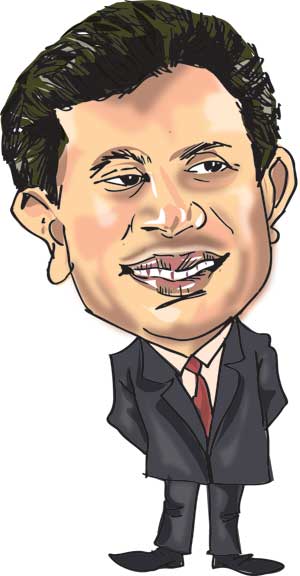
With the declaration of the provincial council elections, particularly to the Northern Province, the topic of power devolution dominated the news in the mainstream media. Against the backdrop of growing local and international interest over this election, MP Perera, apparently sought formal answers from the government for his queries, for an assessment on how the system has worked in Sri Lanka since its inception, subsequent to the 1987-Indo-Lanka Accord.
As per the answers, either tabled in the House or orally given, the Uva Provincial Council, constituted for the first time on May 5, 1988, has passed 82 statutes up to now. Sabaragamuwa Provincial Council has passed only 37 statues since its first
_DM-12-3.jpg)
constitution on the same day. The North Western Provincial Council has, however, adopted as many as 112 statutes, and it is considered by political analysts as the best council to have utilised powers granted by the 13th Amendment to the Constitution. Meanwhile, the number of statutes, adopted by the Western Provincial Council stands at 82.
The 13th Amendment has given authority to the provincial councils to make statutes applicable to them, and that has to be done only on the subjects included in the provincial list. Plans and plan implementation, education and educational services, local government, provincial housing and construction, roads and bridges, social services and rehabilitation, agriculture and agrarian services are among these subjects.
The statutes, adopted by most other provinces, are yet to be announced formally in Parliament. Based on the details presented, Mr. Perera asked whether the provincial councils had failed to make maximum use of the powers granted to them.
"Here, we can understand how ineffective the provincial councils have been in using powers given to them?" he said.
Nimal Siripala's awakening to reality
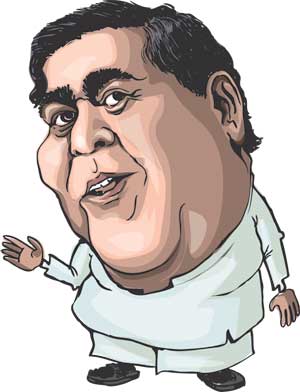
Leader of the House Nimal Siripala de Silva replied that these provincial councils had passed numerous statutes, and therefore none could dispute their efficiency. However, UNP MP Ajith P. Perera said all those statutes, adopted were on minor matters such as licence fees and stamp duties, and therefore, it could not be considered as effective use of power.
Mr. de Silva awakening to the reality at this point said. "There is some fact in what MP Perera said. In fact, it is the duty of the opposition to raise such matters at the provincial council meetings. You should tell your provincial council members to take up this issue at the relevant forums."
TNA's 'intellectual homework'
More than any other party, the Tamil National Alliance (TNA) is keen on the pros and cons of the 13th Amendment and the provincial council system established under it. The TNA which is mustering its fullest possible strength to win the Northern Provincial Council Election conducted a workshop in Kilinochchi on August 11, for its candidates contesting this crucial election.
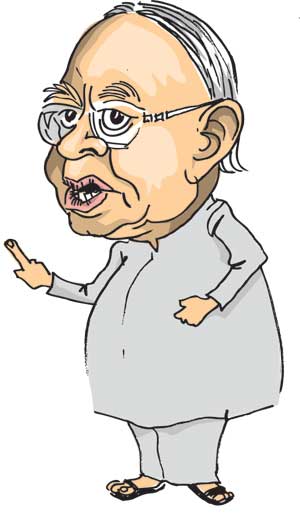
TNA's chief candidate, Justice C.V. Wigneswaran, the Dean of the Colombo Law Faculty V.T. Thamilmaran and retired civil servant Krishna Kumar conducted lectures for the candidates on the 13th Amendment and the provincial council system, and the Provincial Council Election Act.
Mr. Wigneswaran pointed out to the participants that the provincial council would give some power over local affairs for the Tamil people.
"Actually, the provincial council system was important only for the North and the East. There is no relevance of it to the seven other provinces where there is the same ethnic and cultural group living. We are a different ethnicity," he said.
He said the TNA, if elected to office, should co-operate with the government to run the council effectively and
_DM-12-4.jpg)
smoothly.
However, some candidates were irked by such remarks. They said the government had never sympathised with the cause of Tamils, and would not do so in future too. There were a few candidates who did not turn up for the workshop.
Former TNA MP M.K. Sivajilingam, a contestant, remarked openly that only the international pressure would force the government to share power with the Tamils.
"The government is not ready to politically empower Tamils at least at local government levels. Therefore, it is all the more important to seek the support of the international community to prevail upon the government. Otherwise, they will not be ready to give any form of power to us," he told the audience.
Sampanthan in fund raising drive
While the candidates were in election mode campaigning in the North, TNA leader R. Sampanthan and National List MP M.A. Sumanthiran were in a fund raising drive in Canada. The two members who hold much sway in running the affairs of the TNA, left for Canada to have a dialogue with the representatives of the Tamil Diaspora. The LTTE front, Canadian Tamil Forum, has already thrown its weight behind the nomination of justice Wigneswaran as the chief ministerial candidate.
Having had talks with the Tamil representatives in Canada, the two TNA leaders left for the United States on Monday to have talks with the officials of the State Department, possibly on the ground situation here in terms of the election. The duo is expected to return to the country on Friday.
The United States (US), along with India, has taken a keen interest in this poll. In fact, the US sponsored resolution, adopted by the United Nations Human Rights Council (UNHRC), welcomed the government's announcement to conduct elections in the North on the basis that it would give some form of authority to the ethnic Tamils to direct their affairs.
Bad omen for Dayasiri?
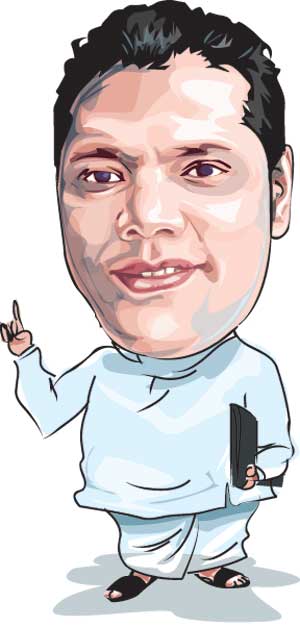
The split among the United People's Freedom Alliance (UPFA) candidates in the Kurunegala district which is part of the North Western Provincial Council has widened. With entry of former United National Party (UNP) MP Dayasiri Jayasekara on the UPFA ticket this time, as the chief ministerial candidate, as claimed by him, has increased the campaign heat. It has become quite obvious that the leading candidates are trying to outsmart each other, eying to obtain more preferential votes at the election.
Senior Minister S.B. Navinna, who once tried to be the chief ministerial candidate and backtracked later due to a request by the government, welcomed Mr. Dayasiri's entry. On Sunday, he arranged another meeting in support of the candidacy of Mr. Jayasekara at his residence in Wariyapola. Mr. Jayasekara arrived for the meeting in his Hummer vehicle. As he was walking to the place where the meeting had been arranged, ironically, a flying crow released its droppings, right on his shirt leaving it smeared, which appeared to be a bad omen as is popularly believed.
His supporters, assembled at the moment for the meeting, brought him a blue shirt from inside the house. Mr. Jayasekara is identified with green colour in the area as he was a UNP strongman. Reminding this to him, a supporter jovially asked, "Are you familiar with this colour sir?'
In the same lighter vein, he said, "Why not, I know what it is."
After the meeting, he went to Galgamuwa electorate for several other meetings which had been arranged by former UPFA MP Bandula Basanayake.
Hummer car raises eye brows
Much in talk in the area is how MP Jayasekera, as the latest addition to the government from the UNP, got rich enough to use a Hummer, a super luxury vehicle for campaign work. It is learnt that the vehicle has been given to him for use during the election period by a leading poultry industrialist called 'Nandapola Sarath'.
Mr. Jayasekara charged that a few of supporters had been assaulted in the Nikaweratiya area. "There are instances where my posters had been removed," he said.
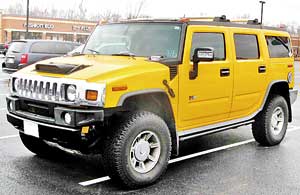
Businessmen are used to make such donations for politicians during election times, possibly expecting better returns or political favours.
A campaign is underway in full swing for Johan Perera, the son of Co-operatives and Internal Trade Minister Johnston Fernando. Amid accusations that he is behind violence against other candidates, there was a meeting at his residence in Kurunegala on Monday. There, some of his supporters brought to his notice that identity politics based on religion had surfaced ahead of the election. In this case, they said some rival candidates were trying to project Minister Fernando, a catholic, as a politician with anti- Buddhist sentiments.
Johnston claims son playing a clean game
However, the Minister's supporters decided to quell what they called 'such malicious propaganda'.
"It was Minister Fernando who made the first donation to build a Buddha statue on the top of Athagala in Kurunegala. It is visible for everyone for veneration today," a supporter said.
Besides, Minister Fernando himself said he had no need to unleash violence against anyone because his son was well projected to win this election with the blessings of everyone.
"There will be a clear victory for my son. It is certain. Then, why should we tarnish our reputation by resorting to violence," he said at the meeting.
Veddah youths win gentlemen's game
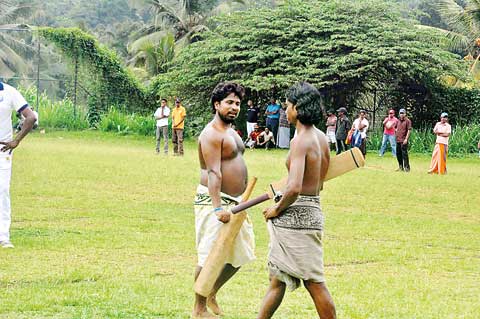
Amid campaign heat in the election areas, there were fun filled sports activities organised by the Sabaragamuwa Provincial Council (SPC) last Saturday in Kegalle. It was a soft ball triangular cricket tournament. The team that drew the attention of spectators most was the one that represented the country's indigenous Veddah community from Dambana.
One team was led by Kegalle district MP Kanaka Herath, the son of Sabaragumwa Chief Minister Mahipala Herath. The tournament started at 9.30 am on Saturday with the first match between the Veddah team and Mr. Herath's team.
Bare bodied Veddah youths, clad in their traditional attire with their daggers safely hung on their shoulders, arrived at the venue in a luxury bus with wide shutters. They got off the bus to be greeted by the massive crowd who had assembled there to see the youths from the Veddah community play cricket, the game of gentlemen introduced by the British.
Cricket, a game played with ultra-modern sports techniques, has taken Sri Lanka to fame in the international area. The game has today inspired even the indigenous community, who are known for pursing their livelihood based on collecting bee honey, hunting animals and traditional cultivation of crops in the wild.
After the welcome ceremony, Veddah youths refused to dine at the tables which had been arranged. Instead, they chose to sit on the mats spread on the ground with their legs crossed. The third team was led by the Vice Chairman of Kegalle Urban Council Jaya Santha.
The Veddah team was captained by Uru Warige Heenbanda. The other players were Uru Warige Punchi Banda, Uru Warige Sudu Banda, Uru Warige Kalu Banda,
_DM-12-5.jpg)
Mahakuma, Manchi Kekula and Appuwa.
Running commentary by Veddah announcer
Much to the fun of the game, there was a commentary in Veddah language by Uru Warige Wimalaratne. When MP Kanaka Herath hit a boundary during the match, Wimalaratne, in his commentary, remarked, 'Kanaka Herath Patorian'.
Along with the team, there was a team of vendors from Dambana who brought in traditional products of the community for sale in the area. Among the items on sale were bee honey and some animal teeth. Finally, the cup was won by the Veddah team defeating the team of Mr. Herath at the final.
During the break of the tournament, Veddah players were provided with betel and arecanuts to be chewed, both as a medicine and stimulant. They chopped betel leaves and arecanuts with the use of their dagger and started chewing them enjoyably, giving spectators a novel kind of experience on the habits of indigenous people who have inhabited this country since pre-historic era.
_DM-12-2.jpg) A series of questions appeared in the order paper during recent sittings of Parliament seeking oral answers from the government.
A series of questions appeared in the order paper during recent sittings of Parliament seeking oral answers from the government. With the declaration of the provincial council elections, particularly to the Northern Province, the topic of power devolution dominated the news in the mainstream media. Against the backdrop of growing local and international interest over this election, MP Perera, apparently sought formal answers from the government for his queries, for an assessment on how the system has worked in Sri Lanka since its inception, subsequent to the 1987-Indo-Lanka Accord.
With the declaration of the provincial council elections, particularly to the Northern Province, the topic of power devolution dominated the news in the mainstream media. Against the backdrop of growing local and international interest over this election, MP Perera, apparently sought formal answers from the government for his queries, for an assessment on how the system has worked in Sri Lanka since its inception, subsequent to the 1987-Indo-Lanka Accord._DM-12-3.jpg) constitution on the same day. The North Western Provincial Council has, however, adopted as many as 112 statutes, and it is considered by political analysts as the best council to have utilised powers granted by the 13th Amendment to the Constitution. Meanwhile, the number of statutes, adopted by the Western Provincial Council stands at 82.
constitution on the same day. The North Western Provincial Council has, however, adopted as many as 112 statutes, and it is considered by political analysts as the best council to have utilised powers granted by the 13th Amendment to the Constitution. Meanwhile, the number of statutes, adopted by the Western Provincial Council stands at 82. Leader of the House Nimal Siripala de Silva replied that these provincial councils had passed numerous statutes, and therefore none could dispute their efficiency. However, UNP MP Ajith P. Perera said all those statutes, adopted were on minor matters such as licence fees and stamp duties, and therefore, it could not be considered as effective use of power.
Leader of the House Nimal Siripala de Silva replied that these provincial councils had passed numerous statutes, and therefore none could dispute their efficiency. However, UNP MP Ajith P. Perera said all those statutes, adopted were on minor matters such as licence fees and stamp duties, and therefore, it could not be considered as effective use of power.
_DM-12-4.jpg) smoothly.
smoothly. The split among the United People's Freedom Alliance (UPFA) candidates in the Kurunegala district which is part of the North Western Provincial Council has widened. With entry of former United National Party (UNP) MP Dayasiri Jayasekara on the UPFA ticket this time, as the chief ministerial candidate, as claimed by him, has increased the campaign heat. It has become quite obvious that the leading candidates are trying to outsmart each other, eying to obtain more preferential votes at the election.
The split among the United People's Freedom Alliance (UPFA) candidates in the Kurunegala district which is part of the North Western Provincial Council has widened. With entry of former United National Party (UNP) MP Dayasiri Jayasekara on the UPFA ticket this time, as the chief ministerial candidate, as claimed by him, has increased the campaign heat. It has become quite obvious that the leading candidates are trying to outsmart each other, eying to obtain more preferential votes at the election.
 Amid campaign heat in the election areas, there were fun filled sports activities organised by the Sabaragamuwa Provincial Council (SPC) last Saturday in Kegalle. It was a soft ball triangular cricket tournament. The team that drew the attention of spectators most was the one that represented the country's indigenous Veddah community from Dambana.
Amid campaign heat in the election areas, there were fun filled sports activities organised by the Sabaragamuwa Provincial Council (SPC) last Saturday in Kegalle. It was a soft ball triangular cricket tournament. The team that drew the attention of spectators most was the one that represented the country's indigenous Veddah community from Dambana._DM-12-5.jpg) Mahakuma, Manchi Kekula and Appuwa.
Mahakuma, Manchi Kekula and Appuwa.